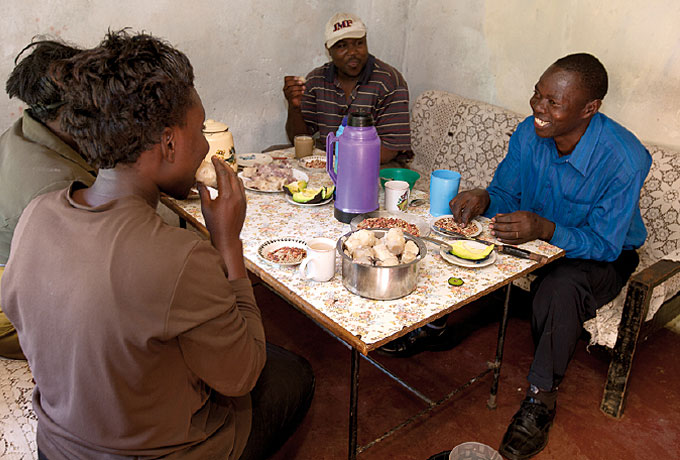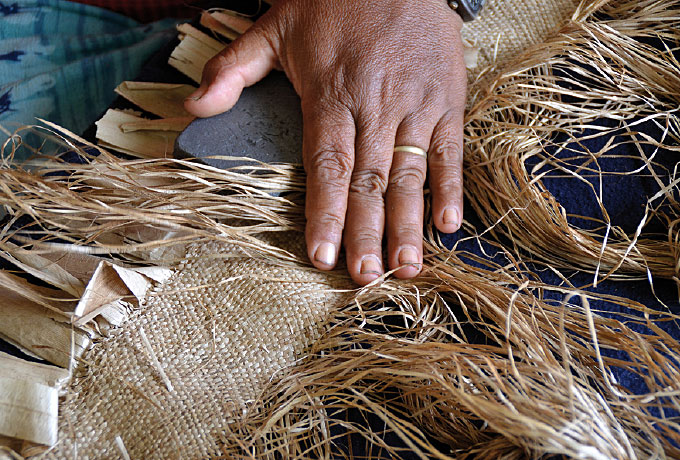-
INTANGIBLE CULTURAL
HERITAGE FOR
SUSTAINABLE
DEVELOPMENTIntangible cultural heritage helps sustainable development of communities around the world by contributing to food security, maintaining good health, sustaining livelihoods, respecting environmental sustainability, resolving disputes and strengthening social cohesion. More than 150 countries have joined hands to achieve this mission through the 2003 Convention for the Safeguarding of the Intangible Cultural Heritage.
-
-
CONTRIBUTING
TO FOOD SECURITYThe Isukha people live on the edge of the Kakamega rainforest in western Kenya, and their knowledge of the local resources and traditional foodways is vital to their community’s well-being. Their diet consists largely of what they grow, herd and collect from the wild. Community members pass on traditions and experiences related to food preparation, knowledge of the flora and fauna, nutritional facts and needs of the body, seasonal influences, and rituals involving foods prepared for celebrations. Thanks to these traditional foodways, the Isukha people can be self-sufficient and live in harmony with their environment, fulfilling their needs.





-
-
-
MAINTAINING
GOOD HEALTHBurying patients in hot sand is a traditional healing technique practised by Mr Abass in the Egyptian town of Damiette for treating ailments of the bones and joints. Performed only in summer, when the sand can achieve the optimal temperature, the therapy often lasts one week, after which the patient needs to rest for three weeks. The treatment is especially popular among the many local fisher-folk, relieving the pains they suffer from the harsh weather conditions that are inherent to their profession.





-
-
-
SUSTAINING
LIVELIHOODSFamily farmers in Estonia raise sheep and process wool in harmony with nature and local tradition. This way of life provides them with a source of livelihood and identity. They keep alive local handicraft traditions, spinning yarn for knitters as well as making felted woollen items, from infant panties to blankets. Sheep fat is used for making candles and soap, and hides are tanned to serve as rugs or bedding. The families share their knowledge with the local community and other Estonian sheep breeders, be it shearing sheep or colouring wool with natural dyes.





-
-
-
RESPECTING
A SUSTAINABLE
ENVIRONMENTThe fine-woven mats of Samoa are used as a form of currency to meet cultural obligations or paraded in ceremonial occasions marking milestone events in the life of individuals or communities. Over time, a significant body of traditional ecological knowledge became associated with weaving, including the cultivation of preferred varieties of the pandanus, a palm-like tree that is the main stock for weaving. This knowledge helps Samoans preserve their environment, knowing that it is from nature that so much of their well-being depends. Made from vegetation, weavings decompose naturally, making for a relatively quick process from planting to harvesting, using and discarding, unlike plastics and other environmentally harmful products currently available.





-
-
-
RESOLVING
DISPUTESWater is a scarce resource in the semi-arid Spanish regions of Murcia and Valencia, agricultural lands with complex irrigation systems built during medieval times under Muslim rule. Water is essential for growing the vegetables, fruits and flowers for which the regions are known, and disputes over its use can easily arise. The Council of Wise Men of the plain of Murcia and the Water Tribunal of the plain of Valencia meet every Thursday to resolve such disputes. Their verdicts are known to be equitable and wise, having the legal validity of any other civil court.





-
-
-
STRENGTHENING
SOCIAL COHESIONFrevo is an artistic expression in Brazil’s State of Pernambuco that gathers music, dance and crafts. During the Carnival preceding the Catholic Lent, Frevo parades take over the city of Recife, but its population keeps it alive all year round through Carnival associations that gather people from all social strata for recreational activities. Frevo is the shared heritage of all, giving them a sense of identity and strengthening community values that transcend differences of gender, ethnicity, class and locality. This ability to promote simultaneously both human creativity and respect for cultural diversity is inherent to Frevo since its origins as a platform for universal exchange.





-
